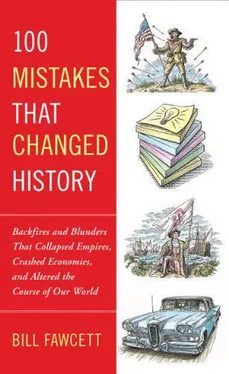Germany did not have the monopoly on racism in the 1940s. The Americans put tens of thousands of Japanese Americans into camps for no more reason than they looked Japanese. The heroic combat record of the Nisei division in Italy shows the fallacy of that action. There was also the treatment by the army of black soldiers. Many were allocated to noncombat roles and denied promotion on no other basis than their skin color. It wasn’t until twenty years after the end of World War II that the last Jim Crow laws disappeared. But anything any of the Allies did paled compared to the sheer barbarism of the Japanese toward other Asian peoples and everyone else during the war.
In places such as Indochina and the Philippines, it had not been that long since British, French, and American troops had been battling with local independence movements. One of the reasons the Thompson machine gun was developed was to knock down machete-swinging Philippine rebels who were impervious to pain because of the druglike effects of the plants they chewed. Certainly as soon as the Japanese left, all of Vietnam went right back to trying to throw out the French. Each of these countries had millions who would and did embrace a pan-Asian philosophy. But the Japanese soldiers were indoctrinated to treat everyone not Japanese as inferior and not really human. This attitude was so pervasive that all over Asia it was rare to see any non-Japanese assisting them in combat. This contrasts with the tens of thousands of Indian and Malaysian troops that joined with the British to repel the Japanese. In almost every country where Japanese had been welcomed for throwing out the European colonial master, within days, powerful resistance movements had sprung up.
The Japanese had a habit of shooting or beheading anyone who annoyed them, even their own soldiers, without as much as a hearing. This behavior reflected the barbarism that permeated all of their behavior. Officers treated their men with disdain, and the common soldiers passed on that hate and brutality with enthusiasm. The Japanese made it clear to all other Asians that they were held in contempt and were unworthy of respect. Americans rarely remember that 80 percent of those who died on the Bataan Death March were Philippine. The Philippine people never forgot, though. By actually acting like they promised to with their co-prosperity sphere, Japan might have been able to recruit literally millions of new soldiers. They could have much more effectively tapped the resources of Indochina and might even have had enough soldiers to complete the conquest of China. The entire war in China and the Pacific would have been far different and an Allied victory far from assured.
The mistake and cost of racism were obvious even at the time. But like the Confederacy being asked to recruit former slaves as soldiers, the Imperial Japanese and Nazi Germans found that acting against their prejudices was inconceivable. They had every reason, and hard necessity, to treat potential allied peoples well and always failed to do so. Simple racism, more than any strategic blunder, doomed the fascists.
85. STUCK TO A BAD BARGAIN
Stopping at the Elbe
1945
At the time of the Yalta conference, World War II in Europe was almost over. By February 1945, the Germans’ last gasp, the surprise attack at Ardennes, had failed. There was no further chance of a serious German counterattack. The three leaders who met there, Roosevelt, Stalin, and Churchill, knew this. Germany had no more left, and Japan, while still dangerous defending their islands, had no offensive strength left. The discussions and agreements were more about the shape of post-war Europe than about the ongoing war. There were actually two major areas of agreement at Yalta. One was to confirm the formation of the United Nations and its structure. The other laid out who would occupy what parts of Germany and the fate of the rest of occupied Europe.
Poland was to be clearly under the Soviet thumb. Russia had not done well against invasions coming out of Poland since the Red Army almost lost the 1920-1921 Polish-Soviet War. They were taking no chances of that happening again, even if it meant occupying Poland forever. There were details, but Stalin publicly agreed that most of eastern Europe would get elected governments within a year or so. History has shown the Soviet dictator had no intention of keeping his word on any free elections, but the United States wanted his help if it became necessary to invade the Japanese home islands, so they accepted this. Any invasion of the homelands was going to be vicious and generate a lot of casualties. A million or so hardy Russian soldiers joining in could make the conquest a lot easier. Also there were Japanese soldiers in Asia—mostly in China, Korea, and Mongolia—who needed pressure kept on them.
Between February and late April, the Allied armies pushed into the heart of Germany. By late April, the question was more one of what areas would be occupied rather than of defeating those remnants of the Wehrmacht that were still fighting. There was also concern about rumors of a guerrilla army forming in the south German mountains. These turned out to be false, but it was a worrisome possibility. The big question was, where would Eisenhower push? To the frustration of Patton and other commanders, the decision was made to turn away from Berlin and to actually reverse any penetrations into eastern Europe. This was ordered even as it became more apparent that Stalin had no intention of granting any real elections or giving up one ounce of control in any part of the nations Russia occupied. Word came down from Roosevelt, and the U.S. Army was effectively ordered to concede eastern Europe to the Soviets. The mistake here was not agreeing to the terms at Yalta. The mistake was not being concerned about a final guerrilla retreat in the mountains that never existed. The Americans’ real mistake was adhering to their parts of the treaty when it was already apparent the communists had no intention of honoring any of it.
Had the U.S. president and army been prescient enough to foresee the Cold War, as Churchill did, would Eisenhower have ordered a continued push? His divisions could have gotten to Berlin first, considering how resistance had collapsed. It would have been possible for the highly mobile American mechanized divisions to reach Austria, Berlin, Albania, Bulgaria, and maybe Czechoslovakia. Would, as Patton expected, or maybe hoped, this have resulted in a shooting war between the former allies? It was a war that neither side would have been guaranteed to win. But Russia was a nation as tired of war as the others.
There is no way to know what the world might have looked like had Roosevelt and then Truman risked war and stood up to Stalin. What America did instead was stick to the terms of a treaty that had become meaningless. This mistake resulted in tens of millions of eastern Europeans being condemned to fifty years of communist repression.
What Sphere of Influence?
1950
Adiplomat’s tool is words, and it is reasonable to assume someone who has risen to be the top diplomat for the United States means what he says. So when Joseph Stalin and Kim Il-sung invaded South Korea, they were shocked and honestly amazed at the vehement reaction from the United Nations (UN) and the United States. They had every right to be, since effectively they had been given permission to attack by the U.S. secretary of state.
Secretary of State Dean Acheson, on January 12, 1950, made a speech to the National Press Club. This was a policy speech and not casual remarks. It seemed likely that the speech was intended to act as a warning to the now-antagonistic communist Russia, China, and their satellites. In this speech, Acheson described the American post-World War II sphere of influence as it extended all over the world. The problem came when he described the U.S. interest in the Pacific and mentioned Japan, but not Korea. Imagine Kim Il-sung’s joy when he heard that coveted South Korea was not protected by the United States.
Читать дальше












